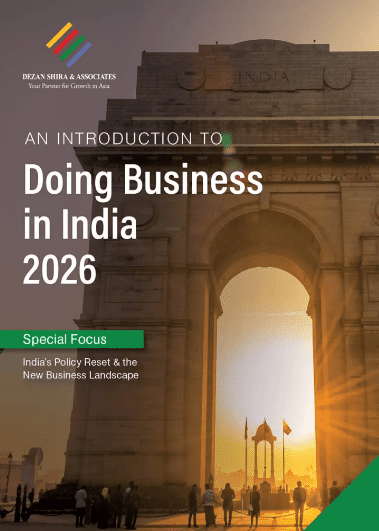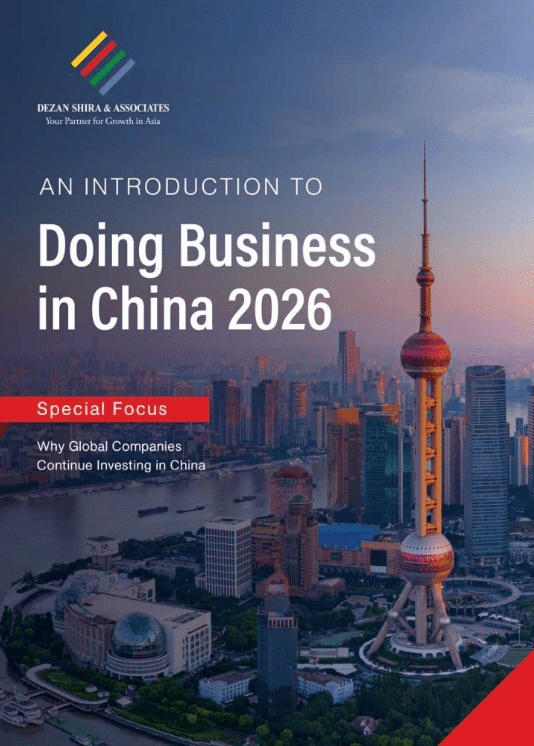Chancellor Merz’s Visit to ADNOC Deepens UAE–Germany Relations

The official visit of German Chancellor Friedrich Merz to the headquarters of the Abu Dhabi National Oil Company (ADNOC) signaled the consolidation of a structural shift in UAE–Germany economic relations: from short-term energy procurement toward long-term strategic integration across LNG, advanced materials, renewable energy storage, ammonia, and industrial digitalization.
For businesses and investors, the implications extend well beyond LNG contracts.
One Central Registration: India’s Answer to Labor Compliance Complexity

India’s four new labor codes, expected to be operational nationwide by April 1, 2026, introduce one central registration framework for employers in India, cutting duplication while preserving statutory worker protections.
China Enforces Higher Salary Thresholds for A/B Work Permits

The foreigner’s work permit in China is undergoing significant changes as major cities strictly reenforce higher salary thresholds for Category A and B applicants. These updates affect both new applications and renewals, particularly in Beijing and Shanghai, where multiplier-based salary validation is now mandatory. Employers and foreign employees must prepare for heightened documentary requirements and stricter renewal timelines.
How India’s New Labor Codes Will Reshape M&A Transactions in 2026

India’s new labor codes are reshaping the M&A landscape in India by altering valuation models, workforce liabilities, and integration costs, requiring buyers to treat labor diligence as a core financial and deal-structuring exercise.
An Introduction to Doing Business in India 2026

Designed to introduce the fundamentals of investing in India, this publication is compiled by the experts at Dezan Shira & Associates.
Topics covered:
- HR and payroll
- Policy overhaul of 2025
- India’s investment climate
- Structuring India operations
- Audit and financial reporting
- Trade environment
- DPDP law
Local Director and Management Presence Requirements in Singapore

For foreign investors evaluating Singapore as a base for regional or international operations, local director and management presence requirements are best understood as a governance design issue.
Topics covered include:
- Why Singapore requires local oversight
- The resident director requirement
- Who may act as a resident director?
- Director responsibility and shareholder control
- Management presence in day-to-day operations
Indo-German Business Magazine 4/2025

Indo-German Chamber of Commerce
How is healthcare innovation shaping the future of Indo-German business collaboration?
This issue brings together expert insights, industry perspectives, and real-world examples on how healthcare innovation, partnerships, and technology are strengthening Indo-German ties in one of the most critical sectors for sustainable growth.
UAE Employment Law Updates: Key Developments in 2024/2025 and What They Mean for 2026

The UAE’s recent Employment Law reforms strengthen employee protections, streamline dispute resolution, and raise compliance expectations for employers. These changes, extending into 2026, signal a more structured regulatory environment requiring businesses to adopt proactive, disciplined HR and legal practices.
Czechia: Crowdworking only in employment?

A European directive targets platform work such as Uber, Bolt, etc. and introduces the presumption of employment. How does this affect the Czech test of dependent work?
Directive (EU) 2024/2831 of the European Parliament and of the Council on improving working conditions in platform work (the “Directive”) is an EU regulation that affects the definition of the employment status of persons working for digital platforms and further regulates algorithmic work management in detail.
Should Foreign Companies in Indonesia Appoint Local Directors for Governance or Compliance Only?

Foreign companies entering Indonesia often appoint a local director early, usually to satisfy licensing, banking, or operational requirements.
The real decision is not whether a local director is required, but whether that role should remain limited to compliance or extend into governance as the business operates and grows.
An Introduction to Doing Business in China 2026

An Introduction to Doing Business in China 2026 equips investors with up-to-date and practical insights into market entry, regulatory compliance, and operational strategies under evolving conditions. Whether you are planning expansion or optimizing existing operations, this guide helps you navigate China’s opportunities and challenges with clarity and confidence.
Doing Business in China 2026 covers:
- Establishing and Running a Business
- Tax, Audit, and Accounting
- Human Resources and Payroll
- Cybersecurity and Data Protection
CENTRAL ASIA REMAINS A REGION ON THE MOVE

Vladimir Nikitenko, Regional Director for Central Asia at the Committee on Eastern European Economic Relations
How would you evaluate the current economic landscape of the Central Asian states, and what key trends do you anticipate emerging in the coming years?
Central Asia is increasingly coming into the international spotlight in light of global power shifts, not least because of its strategic location as a bridge between Europe and Asia, and its rich natural resources. The region's economies are on a clear growth path: average growth rates have been around 7% in recent years, and inter national institutions expect stable growth to continue in 2026.
KAZAKHSTAN: THE LEVEL OF QUALIFICATIONS VARIES GREATLY

Christian Tegethoff Managing Director, and Nataliya Lyukshina, Research Manager for Central Asia & Transcaucasia, CT Executive Search
What are the prospects for attracting and retaining qualified and motivated employees in Kazakhstan?
The conditions for recruiting qualified and motivated specialists in Kazakhstan are currently favourable. A growing number of managers have international experience, and the language and intercultural skills required to work in European companies.
ARTIFICIAL INTELLIGENCE IN KAZAKHSTAN: NEW LAW OPENS UP STRATEGIC OPPORTUNITIES

Nikolai Knorr, Managing Director & Partner, RSP International Almaty
In September 2025, Kazakhstan took a significant step into the digital age when the Maschilis (the lower house of parliament) passed the first framework law in Central Asia to regulate the field of artificial intelligence (AI). This document is not a mere formality, but represents a significant change in the legal framework for any organisation that uses AI technologies or plans to introduce them.
Oman Labor Market Compliance: New Rules for Foreign Companies and Expatriate Workers

Oman has introduced new labor rules requiring foreign companies to hire at least one Omani national and allowing expatriate workers to change employers if contracts aren’t registered within 30 days, reinforcing its Vision 2040 goals for workforce localization and transparency.
How Cultural Factors Can Impact Foreign Business Success in India

Foreign companies often fail in India due to cultural missteps. Discover key factors and strategies to align leadership, talent, and products with local realities.
Cultural factors – the beliefs, norms, expectations, and interpersonal styles prevalent in Indian society – are not just “soft stuff” but can become hard constraints (or enablers).
AI tools in HR often violate labor law; fines of up to EUR 35 million may be imposed

AI tools in HR often violate labour laws – they discriminate, collect prohibited data and invade privacy. From August 2026, the EU will impose fines of up to EUR 35 million.
Employment Contracts in Indonesia: Fixed-Term Vs Permanent

Indonesia’s workforce of over 140 million makes it an attractive destination for foreign employers, yet hiring in compliance with local regulations requires careful attention to contract structure.
Employers must draft written, bilingual agreements that specify job scope, duration, and termination rights.
Foreigners Working in China: SPC Clarifies Employment Relationship Standards

Foreigners working in China now benefit from clearer legal recognition under Judicial Interpretation II. The Supreme People’s Court expands the conditions under which foreign nationals can be confirmed as employees, including those with permanent residency, valid work permits, or other lawful procedures.
Establishing a Representative Office in Saudi Arabia

Establishing a representative office in Saudi Arabia can help foreign firms to conduct market research and liaison activities under MISA oversight. The model offers a cost-efficient route for market entry, but requires it to fulfil licensing and Saudization requirements, like other entry models.
Where the Jobs Are in 2025: Hiring Trends Across India

India Briefing
In 2025, India emerged as one of the leading global markets for hiring intent, supported by expansion strategies, digital transformation, and strong demand across energy, finance, IT, and communication services.
India continues to demonstrate strong global standing in employment prospects. Indian employers are set to ease hiring in October–December 2025, even as recruitment sentiment shows marked improvement from 2024, according to the latest ManpowerGroup Employment Outlook Survey.
Oman Introduces Formal Remote Work Regulations for the Private Sector

Oman has introduced its first comprehensive regulations on remote work, requiring formal contracts, clear performance evaluation systems, and strict privacy protections. The framework enhances flexibility while ensuring compliance, efficiency, and alignment with the country’s digital transformation goals.
Why a Global Mindset is Critical for Business Success in China

A global mindset is essential for international companies entering or operating in China. It bridges cultural gaps, enhances collaboration, and drives success. This article explores how cultivating a global mindset helps leaders navigate China’s unique cultural dynamics, build trust-based relationships, and unlock long-term business growth in a complex and fast-evolving market.
Processing Payroll for Expats and Locals in India: Key Differences

Learn how payroll processing for expatriates (expats) differs from locals in India, from tax residency and social security to reporting and compliance.
India’s role as a hub for global talent has expanded rapidly in the past decade. Multinational companies are hiring locally and bringing in expats to manage specialized functions. Though locals and expats fall under the same income tax law, the way their salaries, allowances, and deductions are treated differs a lot.
Saudi Arabia in focus: market opportunities for small and medium-sized enterprises

Dr Holger Bingman, Founder and CEO, Thinking Arabian
The competition for talent in Saudi Arabia is intensifying in the wake of growing internationalisation and increasing industry diversity. What long-term trends are emerging in the search for and employment of qualified specialists and executives?
Competition for qualified specialists and executives in Saudi Arabia is increasing significantly. This is not a short-term development, but rather a fundamental change in the course of the country's economic transformation. At this point, a comparison with Dubai in the early 2000s is useful. It was clear there as well, that building an international economic metropolis could only succeed with global talent. However, Saudi Arabia's ambitions under Vision 2030 are much more comprehensive. The comparison can only be made on a significantly higher scale.


